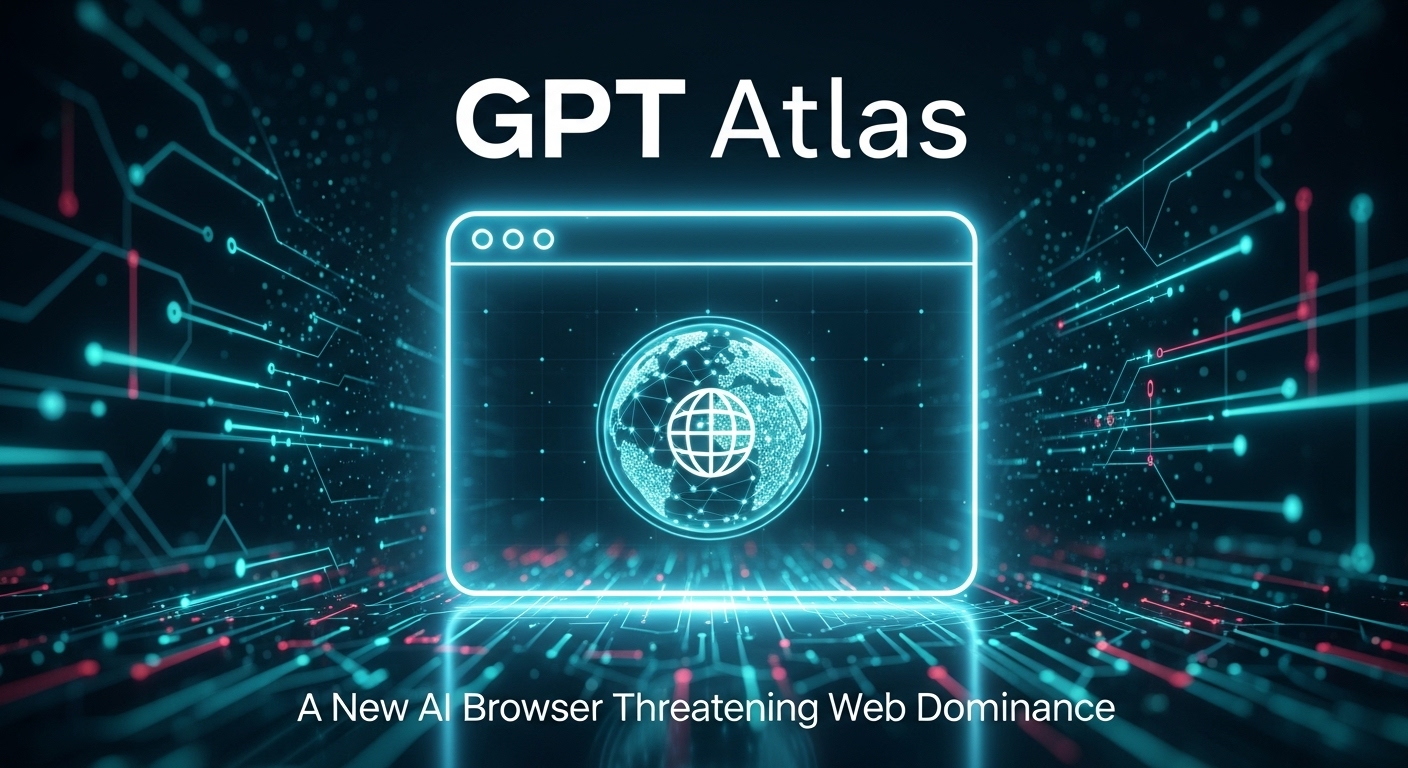【速報】ブラウザの常識を覆すか?OpenAI「ChatGPT Atlas」がGoogle Chromeに宣戦布告!AI時代のウェブ体験はこう変わる!
2025年10月21日、人工知能の旗手であるOpenAIが、新たなAI搭載ウェブブラウザ「ChatGPT Atlas」を発表しました。これは、長らくウェブブラウザ市場の王者として君臨してきたGoogle Chromeへの直接的な挑戦であり、ウェブ体験のあり方を根本から変える可能性を秘めています。今回の発表は、Googleの親会社であるAlphabetの株価に影響を与えるほどの衝撃を与え、テクノロジー業界全体に激震が走っています。
ChatGPT Atlasとは? AIが「あなたのインターネット」になる新体験
「ChatGPT Atlas」は、その名の通り、OpenAIが誇る対話型AI「ChatGPT」を中核に据えたブラウザです。従来のブラウザが情報探索の「道具」であったのに対し、Atlasは「ウェブブラウザと会話できるとしたら?」という問いから設計されました。OpenAIのCEOであるサム・アルトマン氏は、「タブは素晴らしいが、それ以来、ブラウザの革新はあまり見られなかった」と語り、この新ブラウザが「ウェブを最も生産的かつ快適に利用する方法」を再考する「10年に一度の機会」であると強調しています。
革新的な機能の数々
- ChatGPTサイドバーによる常時AIアシスタンス: ブラウザのどのページからでも、ChatGPTに直接質問できます。開いているページの内容をChatGPTが理解し、要約、製品比較、質問への回答、コードの編集やチェックなど、多岐にわたるサポートを提供します。これにより、タブ間のコピー&ペーストは不要になります。
- エージェントモード(有料ユーザー向け): ChatGPTがユーザーに代わってウェブ上でタスクを自動実行する画期的な機能です。レストランの予約、食料品の注文、オンラインレシピからの買い物リスト作成、オンラインフォームの入力など、「インターネットをあなたのために使う」を実現します。この機能は特にChatGPT PlusおよびProユーザーに提供されます。
- ブラウザ記憶機能によるパーソナライゼーション: ChatGPTの記憶機能を活用し、ユーザーの過去の閲覧履歴や好みを学習することで、よりパーソナライズされた体験を提供します。記憶は設定で管理・削除が可能です。
- 分割画面ビュー: ウェブページとChatGPTの会話画面を並べて表示できるため、情報を参照しながらAIと対話する効率的な作業が可能です。
- カーソルチャット: ウェブページ上のテキストをハイライトするだけで、ChatGPTがその場で書き換えや推敲を行うことができます。
- 自然言語コマンド: 「昨日見た靴をもう一度開いて」といった自然な言葉でブラウザを操作できます。
Googleに挑む「AIブラウザ戦争」の勃発
ChatGPT Atlasの登場は、Googleが長年支配してきた検索およびブラウザ市場に真っ向から挑戦するものです。Google Chromeは世界中で約30億人のユーザーを抱え、約68%の市場シェアを持つ圧倒的な存在です。GoogleもGemini AIをChromeに統合し、AI機能の強化を進めていますが、OpenAIのAtlasは「AIファースト」のアプローチでこの牙城を崩そうとしています。
今回の動きは、ユーザーが従来のキーワード検索から、AIが情報を要約・統合して提供する会話型ツールへと移行する「AI駆動型検索」への広範なシフトを加速させる可能性があります。これにより、オンラインパブリッシャーは、AIが効率的に情報をまとめてしまうことで、従来のウェブリンクへのクリックが減少し、広告収入に影響が出るという懸念も浮上しています。
ユーザー体験とウェブ開発の未来
ChatGPT Atlasは、単なる新しいブラウザではなく、インターネットとのインタラクションのあり方そのものを変革しようとしています。ユーザーはより効率的でパーソナルな情報アクセス、そして能動的なAIアシスタンスの恩恵を受けることになるでしょう。
ウェブ開発者にとっても、これは大きな変化の波を意味します。AIがコンテンツを要約したり、ユーザーに代わってタスクを実行したりするようになる中で、ウェブサイトの設計やSEO戦略は再考を迫られるかもしれません。AIが提供する新しいインターフェースや「エージェントモード」の活用が、今後のウェブサービス開発の鍵となるでしょう。
今後の展望
ChatGPT AtlasはまずmacOS向けにリリースされ、今後数週間でWindows、iOS、Android版が提供される予定です。Perplexity AIの「Comet」など、他のAIブラウザも市場に登場しており、AIブラウザ市場はすでに激しい競争が繰り広げられています。
OpenAIの今回の挑戦は、ウェブの未来を形作る上で極めて重要な一歩です。Googleがどのようにこれに対応し、AIを巡るブラウザ戦争がどのように展開していくのか、今後の動向から目が離せません。私たちは、まさにAIが主導する新たなウェブ時代への扉が開かれる瞬間に立ち会っているのです。
OpenAI Unleashes ChatGPT Atlas: A New AI Browser Threatening Google’s Web Dominance
In a bold move that could redefine our interaction with the internet, OpenAI officially launched its AI-powered web browser, ChatGPT Atlas, on October 21, 2025. This highly anticipated release marks a significant escalation in the ongoing AI arms race, positioning OpenAI as a direct challenger to Google’s long-standing dominance in the browser and search markets. OpenAI CEO Sam Altman described the launch as a “rare once-in-a-decade opportunity to rethink what a browser can be about,” suggesting a paradigm shift beyond traditional web navigation.
The AI-First Browsing Experience: What is ChatGPT Atlas?
ChatGPT Atlas is not merely a browser with integrated AI; it’s a browser fundamentally built around ChatGPT, aiming to make web use more interactive and chatbot-like. At its core, Atlas replaces conventional search bars with a ChatGPT chat interface, allowing users to converse directly with their web browser. This innovative approach extends beyond simple queries, enabling a highly personalized and efficient browsing experience. The browser is initially available globally for macOS users, with versions for Windows, iOS, and Android platforms expected soon.
Key features that set ChatGPT Atlas apart include:
- Integrated ChatGPT Sidebar: Users can activate a dedicated “Ask ChatGPT” sidebar on any page to summarize content, analyze data, compare products, or ask questions about what they’re viewing without leaving the site. This real-time, context-aware assistance transforms browsing into a dynamic dialogue.
- Browser Memories: Atlas incorporates optional “browser memories” that allow ChatGPT to remember key details from sites users visit and actions they take. This personalization improves chat responses and offers smarter suggestions, such as creating to-do lists from recent activity or continuing research based on viewed products. Users have full control over these memories, with options to view, archive, or delete them.
- Agent Mode: Available for Plus, Pro, and Business users, Agent Mode enables ChatGPT to perform tasks on a user’s behalf. This includes complex multi-step actions like booking appointments, planning events, ordering groceries from a recipe, conducting research, or editing documents autonomously, always under user oversight.
- In-line Writing Assistance: A “cursor chat” tool allows users to highlight text within any form field or document and instantly request ChatGPT to polish or edit it in-line, eliminating the need for copy-pasting.
- Familiar Functionality: Despite its advanced AI features, Atlas retains standard browser functionalities like tabs, bookmarks, history, and password integration, built on the Chromium engine.
- Enhanced Search Experience: While the browser opens with a ChatGPT-based response for queries, it also provides quick access tabs for traditional search links, images, videos, and news results.
OpenAI’s Bold Challenge to Google’s Dominance
The launch of ChatGPT Atlas represents a direct and formidable challenge to Google, which has commanded over 90% of the search market and whose Chrome browser boasts 3.45 billion global users. OpenAI isn’t just aiming to dethrone Google Chrome as the default browser; Sam Altman envisions ChatGPT becoming the “default operating system for the AI age”. This strategic move alters the power dynamics, giving OpenAI direct access to users who previously relied on Google or Microsoft browsers to access ChatGPT.
The implications for Google’s advertising-driven business model are substantial. AI-powered browsers, with their conversational interfaces and ability to synthesize information directly, can minimize traditional website visits and reduce the data Google collects for ad targeting. This shift from click-throughs to AI-generated answers has already led to declining click-through rates and a reevaluation of SEO strategies. Google has, in turn, intensified its own AI integration, embedding its Gemini chatbot more deeply into Chrome and introducing an “AI Mode” for search, featuring Gemini 2.0 to provide AI responses and curated links.
Interestingly, despite positioning itself as a rival, OpenAI has reportedly used third-party services like SerpApi to scrape Google Search results for real-time queries to help ChatGPT, highlighting a complex interplay of competition and reliance. Nevertheless, with Nvidia’s significant $100 billion investment backing OpenAI, the battle for internet users’ primary interaction point is intensifying. Google’s stock even tumbled following the Atlas announcement, reflecting investor anxiety about threats to Chrome’s longstanding dominance.
The Future of Web Interaction
ChatGPT Atlas joins a growing field of AI-enhanced browsers and search tools, including Perplexity’s Comet and Google’s AI-integrated Chrome, marking a new AI battleground. This evolution signifies a broader shift in how we access and process information online. Users are increasingly seeking direct, synthesized answers rather than lists of links, transforming the internet into a collaborative workspace with an embedded AI assistant.
For content creators and businesses, this means adapting to a landscape where visibility depends on being chosen by in-browser summaries and AI agents as much as traditional search rankings. OpenAI has emphasized user privacy, stating that by default, it will not use browsing content to train its models. Users can toggle site visibility for ChatGPT, clear browsing history, and use incognito mode for further control.
Conclusion: A New Era of Browsing
OpenAI’s ChatGPT Atlas represents a pivotal moment in the evolution of web browsing. By deeply integrating AI into every aspect of the browsing experience, Atlas offers a glimpse into a future where the internet is more intuitive, personalized, and capable of proactively assisting users with tasks. While facing a formidable competitor in Google, OpenAI’s ambitious vision and the innovative features of Atlas are poised to significantly disrupt the browser market and reshape how we interact with digital information. The era of AI-first browsing has truly begun, promising a more efficient and conversational journey across the web.



